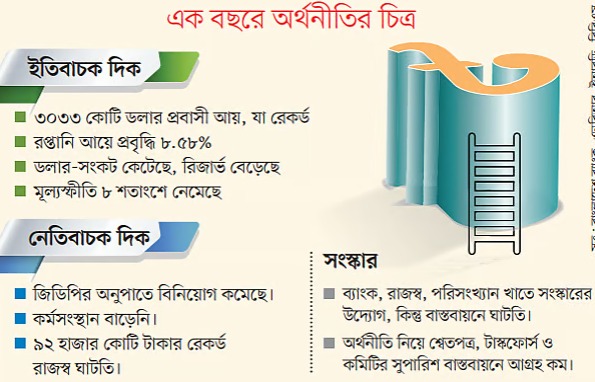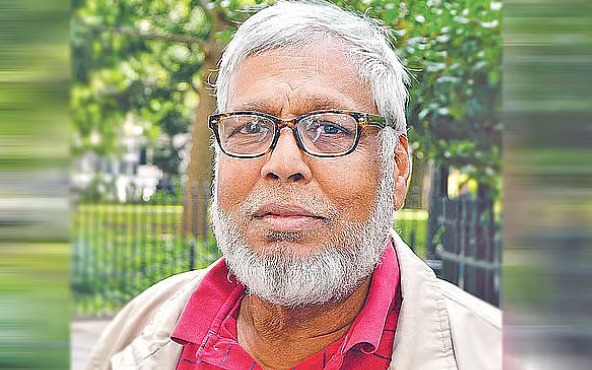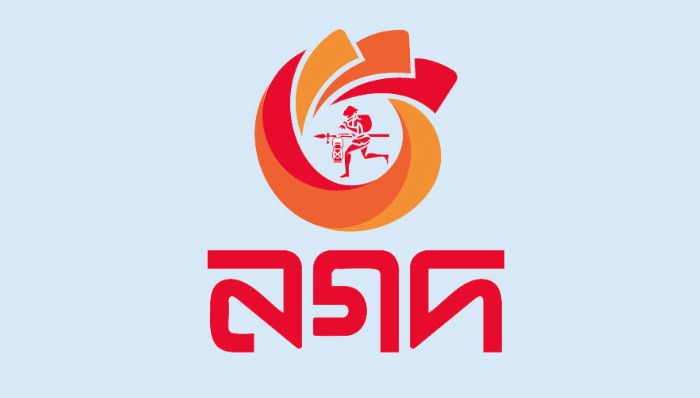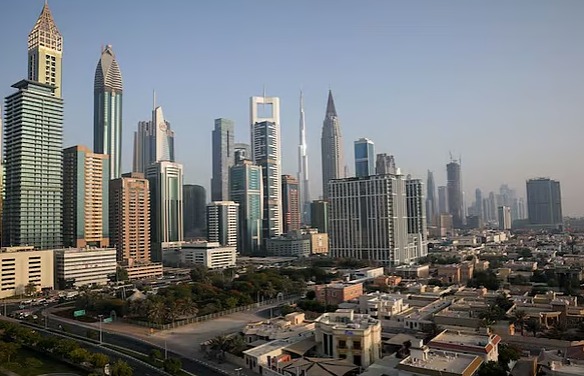Desk Report,
Economic collapse averted, investment uneasy
In the past year of the interim government, the decline in various economic indicators has been prevented. The level of risk has been reduced. However, the economy and trade have not yet been completely free from pressure, and discomfort still remains in several places. There is a kind of uncertainty in trade and investment centered on national politics and elections. The US counter-tariffs have been added to the export sector.
Economic collapse averted, investment uneasy
The good news is that the dollar crisis has been overcome due to the growth in expatriate income and export earnings, and the reserve situation has improved. Controlling imports to rein in inflation has also consolidated the reserve. Initiatives for banking and financial reforms have begun. The central bank is working to pull out the banks that collapsed due to irregularities and corruption during the previous government’s tenure. However, some banks are still not in good shape.
The bad news is that the investment and employment situation remains the same as before. Although inflation has been reduced somewhat, it is still more than 8 percent, which is suffering the poor and people with limited incomes. On the other hand, there is no progress in revenue collection. The government’s foreign debt repayment exceeded $4 billion in the last fiscal year, which is putting new pressure on the economy.
Zahid Hossain divided the assessment of the economy of the past one year into three parts. One. Stability has come from the unstable state of the macro economy. Two. Inflation has decreased somewhat, but there is no room for relief. Three. The misery in the banking sector has not ended. However, the bleeding that was going on has been stopped. In the past one year of the interim government, in addition to the formation of a white paper preparation committee on the economy, several committees were formed on task forces, revenue, and statistics. The government does not seem to be interested in fully implementing the recommendations made by these committees.
Regarding these issues, Zahid Hossain, former chief economist of the World Bank’s Dhaka office, told Prothom Alo that a year ago the economy was on the edge of a cliff. Now, the distance from the cliff has only increased slightly. Although reform initiatives have been taken in various sectors, there is a lack of implementation due to various complications.
Zahid Hossain divided the assessment of the economy of the past one year into three parts. One. Stability has come from the unstable state of the macro economy. Two. Inflation has decreased somewhat, but there is no room for relief. Three. The misery in the banking sector has not ended. However, the bleeding that was going on has been stopped. Now there is no panic in the banking sector. Zahid Hossain also said that the stagnation that existed regarding investment and employment. That situation has not improved.
Except for expatriate income and export income, all other indicators were downward. The current interim government is getting an economy that is largely in a broken and broken state.
What was it like a year ago
The country’s economy has been going through various crises during the last few years of the Awami League government. Especially in the last two years of that government, the economy was on the decline. The severe dollar crisis, bank looting in the name of loans, and money laundering abroad have deepened the wounds of the economy. At that time, high double-digit inflation in housing suffered the common people.
During the Awami League government, a few businessmen and relatives of the ruling elite benefited from the steps taken for nepotism and group interests. The Awami League government left with a debt of about 18 lakh crore taka. Except for expatriate income and export income, all other indicators were down. The current interim government has a largely broken and broken economy.
What happened in a year
One of the biggest challenges for the new government was to control inflation. The government took steps to reduce inflation by increasing interest rates and controlling imports. As a result, some success was achieved. In a year, overall inflation came down from 12 percent and food inflation from 14 percent to single digits. Overall inflation is still more than 8 percent.
However, market supervision and street extortion have not stopped. Only the players who take extortion have changed. The violence of middlemen has not decreased. It has not been possible to bring the law and order situation under control. This has not reduced the uncertainty in the business, trade and industrial sectors, especially the ready-made garments sector. The investment and employment situation has not improved much. The new government has come and held investment conferences, but the situation has not improved much.
According to the Bangladesh Bureau of Statistics (BBS), government investment has decreased compared to the gross domestic product (GDP) of the last fiscal year (2024-25) compared to the previous year. The private investment situation is even worse. According to the BBS, as of last December, 2.73 million people are unemployed. The unemployment rate is high among the young population. In addition, there are about 10 million people who have not found a job of their choice, who are called pseudo-unemployed.
The implementation of the Annual Development Program (ADP) in the outgoing fiscal year has been the lowest in the last 20 years. Only 68 percent of the ADP was implemented in the 2024-25 fiscal year. If the implementation of ADP is low, it affects employment.
Foreign debt repayment is creating new pressure on the economy. Debt repayments for major projects including the Metrorail, Karnaphuli Tunnel, the third terminal of Hazrat Shahjalal International Airport, and the Padma Bridge rail link have begun. As a result, the first-time foreign debt repayment in the last fiscal year exceeded $4 billion, which is almost half of the debt relief in the last fiscal year. Half of the debt relief was provided by the Asian Development Bank (ADB), the World Bank, and Japan. On the other hand, India, China, and Russia did not promise to provide any loans in the last fiscal year.
Meanwhile, the situation in the revenue sector has worsened. There was a deficit of about Tk 92,000 crore in the last fiscal year, which is a record so far. There has also been a major movement in the NBR regarding the initiative to reform the revenue sector. Work has not been in full swing for about one and a half months. The movement in the revenue sector and the mass uprising in July-August




